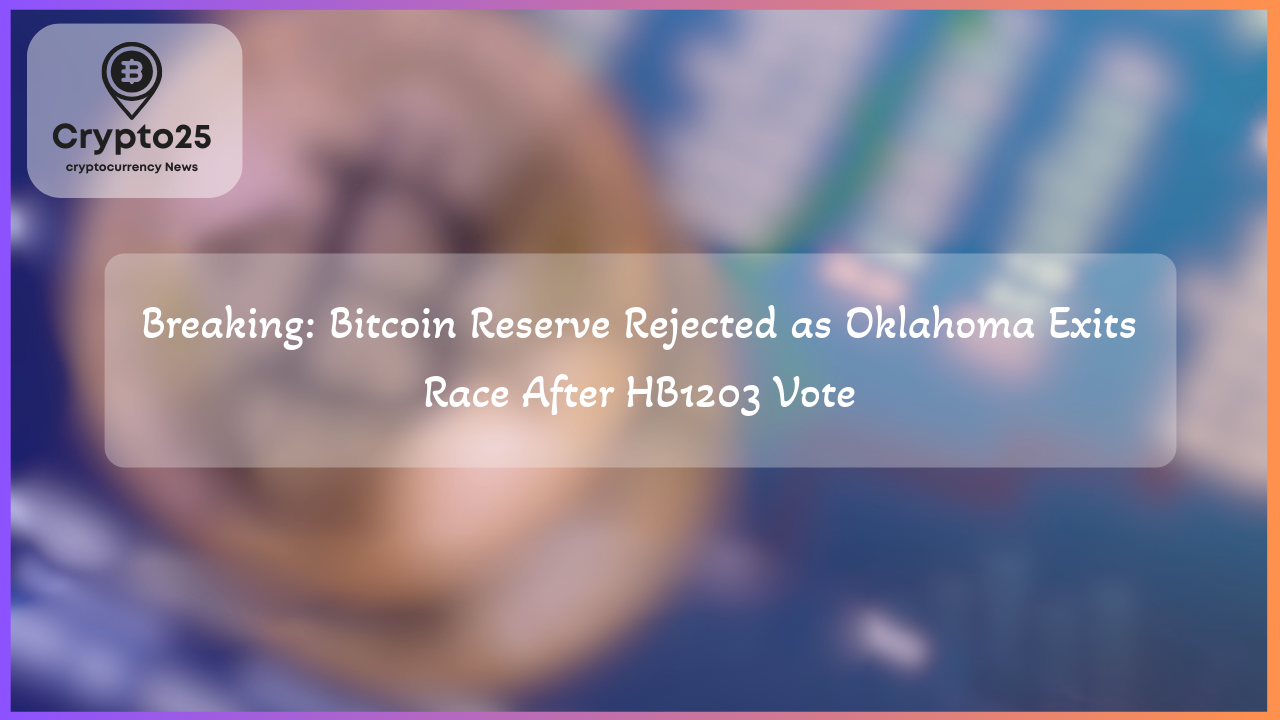
The defeat of Oklahoma’s Strategic Bitcoin Reserve Act, HB1203, marks a significant development in the ongoing debate over state-level cryptocurrency adoption in the U.S. Despite initial momentum, the bill failed to pass in the Senate Revenue and Taxation Committee by a slim 6–5 vote. The proposed legislation sought to position Oklahoma as a pioneer in institutional Bitcoin investment while leveraging digital assets to enhance the state’s financial resilience.
### Oklahoma Bitcoin Reserve Act Aimed to Integrate Crypto Investing Strategies
HB1203, introduced on January 15 by Representative Cody Maynard, proposed a robust strategy to integrate digital assets like Bitcoin (BTC) into Oklahoma’s financial framework. Specifically, the bill sought to allow the State Treasurer to allocate a maximum of 10% of funds from key financial accounts—the General Fund, Constitutional Reserve Fund, and Revenue Stabilization Fund—into Bitcoin and other major cryptocurrencies with market caps exceeding $500 billion, including select stablecoins.
By mandating the use of regulated custodians, the bill also outlined cashing out BTC tax proceeds in U.S. dollars before transferring them to the state treasury. Moreover, additional provisions aimed at incorporating cryptocurrency investments within state-managed retirement funds and utilizing staking mechanisms further demonstrated the state’s interest in crypto-backed growth. Yet, these ambitious plans failed to sway enough senators to approve.
| Title | Details |
|---|---|
| Market Cap Requirement | $500 billion+ |
Representative Maynard defended the proposal as a forward-looking hedge against the perceived risks of government overreach and inflation. Advocating Bitcoin’s decentralized foundation, Maynard highlighted its potential as a store of value, asserting, “Bitcoin represents freedom from bureaucrats printing away our purchasing power.”
### Bipartisan Opposition Hampers Oklahoma’s Crypto Ambitions
Despite strong early support, bolstered by a 12–2 win in the House Government Oversight Committee on February 25, and a decisive 77–15 vote in the full House on March 24, the initiative met fierce resistance in the Senate Revenue and Taxation Committee. On April 14, a coalition of both Republican and Democratic senators blocked the legislation. Key opponents included Senators Chuck Hall (R), Julia Kirt (D), Brent Howard (R), and Dave Rader (R), whose collective “No” votes reflected broader skepticism about cryptocurrency as a stable state-level investment.
The proposed enactment date of November 1, which would have aligned Oklahoma with states like Texas and Arizona in the race to adopt crypto-focused fiscal policies, will no longer materialize. Instead, Oklahoma now steps back, allowing other states to lead the charge in leveraging Bitcoin as an institutional financial tool.
### Broader Implications for State-level Bitcoin Adoption
The narrow defeat of HB1203 not only affects Oklahoma’s crypto aspirations but also underscores the divisive nature of digital asset policies at the state level. Proponents of the bill argued that Bitcoin offers financial hedge properties analogous to gold, particularly when navigating economic pressures such as inflation. The failure of this initiative highlights ongoing concerns over the volatility and regulatory complexities tied to digital assets.
In contrast, states like Texas, Arizona, and New Hampshire continue to make strides in drafting regulations focused on integrating cryptocurrencies into public financial structures. Oklahoma’s decision could mark a missed opportunity to join this elite group, potentially disadvantaging the state in capturing future opportunities tied to blockchain technology. The indefinite shelving of HB1203 raises questions about the broader feasibility of Bitcoin reserve strategies for states amid ongoing gaps in federal cryptocurrency regulation.
The Oklahoma Bitcoin Reserve Act may have failed to move forward, but the conversation it sparked will undoubtedly fuel broader debates about Bitcoin’s role as a viable asset for governments navigating modern financial challenges. Whether this rejection signals hesitation toward cryptocurrency adoption or becomes a galvanizing force for other states remains to be seen. For now, Oklahoma cedes its position in the emerging Bitcoin Reserve landscape to more aggressive contenders in the crypto race.
